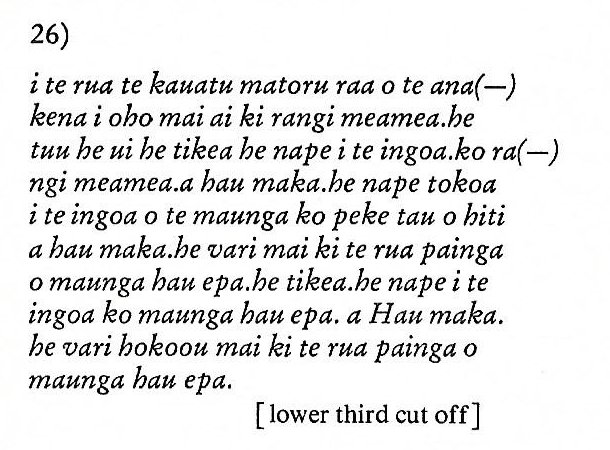
... Gilgamesh is
claimed to have been one of the earliest
kings of Uruk (or Erech). The
circumstances of his fabled birth make him
two-thirds god and one-third man, which
makes him - in the sexagesimal system of
Mesopotamia - two-thirds of 60 (= Anu)
= 40, the number which characterized
Enki-Ea, whence the latter's
denomination of 'Shanabi (= ⅔, i.e.,
of 60) and Nimin (Sumerian = 40)'
...
| he oho hokoou mai
he tuu ki hanga hoonu |
Again
they went on and reached Hanga
Hoonu. They saw it, looked around,
and gave the name 'Hanga Hoonu A Hau
Maka'.
On the same day, when they had
reached the Bay of Turtles, they
made camp and rested [he hakaora]. |
| he ui he tikea
he nape i te
ingoa ko hanga hoo(-) |
|
nu.a Hau maka.i
tau raa ana i
tui ai |
| ki hanga hoonu.he
noho he hakaora. |
|
Tui.
1. To sew mats, to make
strings. E-tahi tuitui reipá i Te
Pei, ekó rava'a e-varu kaukau;
i-garo ai i Hiva, i te kaiga, a
necklace of mother-of-pearl is on
te Pei, few will find it (lit:
eight groups of people); it has
remained in Hiva, in our
homeland. 2. The three stars of
Orion's Belt. Vanaga. |
| i ka ui
atu nei
anake ko te ika e noho era.ku |
They all
saw the fish that were there, that
were present in large numbers - Ah! |
| kake ana ku kake
ana e noho era
aa.he u(-) |
| Atu.
Particle of meaning opposite to
that of mai; it refers to the
second or third person, expressing
movement away: ka-avai-atu,
give it to him: he-oho-atu au,
I am going there, after you;
i-oho-atu-era, when I had gone
there. Vanaga. 1. a. Directive, of
motion from the speaker. b. Somewhat
expressive of the comparative
degree. 2. Pupil; hakaatu,
proof; hare hakaatuga,
schoolhouse, class. 3. (hakaatu),
to presage. 4. (hakaatu),
mark, object. Churchill. |
| ru anake ki roto
ki te vai he (e)a mai ki uta |
Then
they all went into the water [he
uru ki roto ki te vai], moved
toward the shore, and threw the fish
(with their hands) onto dry land.
There were great numbers (?
ka-mea ro) of fish.
There were tutuhi,
paparava, and tahe mata
pukupuku. Those were the three
kinds of fish. |
| he
hoa i
te ika ki uta.ka mea ro.te ika. |
| he tutuhi.he
pararava.he tahe mata puku(-)
|
| puku.katoru ika. |
| Hoa.
1. Master, owner;
tagata hoa papaku, owner or
relative of a dead; hoa manu,
'bird master', that is, he who
received the first egg at the annual
festivals in Orongo; he
to'o mai e te hoa manu i te mamari
ki toona rima, he ma'u, he hoko,
the 'bird master' receives the egg
in his hand and carries it, dancing.
2.Friend, companion: e ga
hoa ê! 3. To cast away,
to throw away, to
abandon, perhaps also to
expel. 4. To confess a sin;
he hoa i te ta'u: term used
of a category of rongorongo
boards (see ta'u).
Vanaga. 1. Friend; repa hoa,
friend (male), comrade, companion,
fellow; to confide; repa hoa
titika, faithful friend; garu
hoa, friend (either sex); uha
hoa, friend (female); hoa
kona, native T. 2. To abandon,
to debark, to cast, to launch, to
anchor, to let go, to give up, to
reject, to repudiate, to suppress,
to cut off, to jerk out, to
proscribe, to reprove; hoahoa,
to upset, to destroy. Churchill.
Ka. Particle of the
affirmative imperative, of cardinal
numerals, of independent ordinal
numerals, and of emphatic
exclamation, e.g. ka-maitaki!
how nice! Vanaga. Ká. 1. To
light a fire in order to cook in the
earth oven (see umu): he-ká i te
umu, he-ká i te kai. 2.
Figuratively: to fire up the soul.
To put oneself in a fury (with
manava): ku-ká-á toona manava he
has become furious. Vanaga. 1. Of T.
2. Imperative sign; ka oho,
ka tere, ka ea,
begone!; ka ko iha, a
greeting T; ka mou, hush;
ka oho, goodbye. 3. Infinitive
sign; mea meitaki ka rava, a
thing good to take; ka harai kia
mea, to accompany. 4. A prefix
which forms ordinals from cardinals.
5. The dawning of the day. 6.
Different (? ke). Churchill.
Mea. 1. Tonsil, gill (of
fish). 2. Red (probably because it
is the colour of gills); light red,
rose; also meamea. 3. To grow
or to exist in abundance in a place
or around a place: ku-mea-á te
maîka, bananas grow in abundance
(in this place); ku-mea-á te ka,
there is plenty of fish (in a
stretch of the coast or the sea);
ku-mea-á te tai, the tide is low
and the sea completely calm (good
for fishing); mau mea,
abundance. Vanaga. 1. Red;
ata mea,
the dawn.
Meamea,
red, ruddy, rubricund, scarlet,
vermilion, yellow;
ariga
meamea, florid;
kahu
meamea purple;
moni
meamea, gold;
hanuanua meamea, rainbow;
pua
ei meamea, to make
yellow.
Hakameamea, to redden, to
make yellow. PS Ta.:
mea,
red. Sa.:
memea, yellowish brown,
sere. To.:
memea, drab. Fu.:
mea,
blond, yellowish, red, chestnut. 2.
A thing, an object, elements (mee);
e
mea, circumstance;
mea ke,
differently, excepted, save, but;
ra mea,
to belong;
mea
rakerake, assault;
ko mea,
such a one;
a mea
nei, this;
a mea
ka, during;
a mea,
then;
no te
mea, because, since,
seeing that;
na te
mea, since;
a mea
era, that;
ko mea
tera, however, but.
Hakamea,
to prepare, to make ready. P Pau.,
Mgv., Mq., Ta.:
mea,
a thing. 3. In order that, for.
Mgv.:
mea, because, on
account of, seeing that, since. Mq.:
mea,
for. 4. An individual;
tagata
mea,
tagata
mee, an individual. Mgv.:
mea,
an individual, such a one. Mq., Ta.:
mea,
such a one. 5. Necessary, urgent;
e mea
ka, must needs be,
necessary;
e mea,
urgent. 6. Manners, customs. 7.
Mgv.:
ako-mea, a red fish.
8. Ta.:
mea, to do. Mq.:
mea,
id. Sa.:
mea,
id. Mao.:
mea,
id. Churchill.
Ro. 1. Of, concerning. 2.
Yet, nevertheless, still;
kakore
ro, our;
ka
kikiu ro, to importune (?
no).
Churchill. |
|
Tutu.
1. Circle of fishing nets
arranged in the shape of a funnels
or baskets. 2. To light a fire;
he-tutu i te ahi: to burn
something. 3. To hit, to strike, to
beat. Tûtú, to shake
(something) clean of dust or dirt;
he-tûtú te oone o te nua, to
shake the dirt off a nua
cape. Tutuhi, to reject the
responsibility for a mistake onto
one another, to blame one another
for a mistake (see tuhi).
Tutuki, to stumble, to trip.
O tutuki te va'e, in order not
to trip. Tutuma, firebrand,
partly burnt stick. Tuturi,
to kneel. Vanaga. 1. To beat bark
for cloth. PS Pau., Mgv., Mq., Ta.:
tutu, id. Sa., To., Fu.:
tutu, id. 2. A broom, to sweep,
to clean. Mq.: tutu, to beat
out the dust. 3. To shake, to
winnow. Mgv.: tutu, to
tremble, to leap. Mq.: tutu,
to shake. 4. To kindle, to light, to
ignite, to set fire, to burn. Mq.:
tutu, to burn, to set fire.
5. To stand; hakatutu, to set
joists. P Mgv., Mq.: tutu, to
stand upright. Ta.: tu, id.
Tutua (tutu 1): board
on which bark is beaten into cloth.
PS Mgv.: tutua, a cloth
beater. Mq., Ta.: tutua, wood
on which cloth is beaten. Sa., Fu.:
tutua, id. Tutui:
tutui ohio, chain, tutui kura,
shawl. Mq.: tuitui kioé,
chain. Tutuki: shock,
contusion, to run against, to
collide; tukukia, to run foul
of. P Pau.: tukituki, to
strike, to pound, to grind. Mgv.:
tukia, to strike against, shock,
concussion. Mq.: tutuki, id.
Ta.: tui, id. Tutuma:
1. (tutu - ma) a live
coal. 2. Tree trunk T (? tumu).
Tutumata, ligament of the
eye, orbit, eyelid. T (tutumate,
eyelid G). Tutuu, bristling.
Churchill.
Papa. 1. Underground
rock; motionless; rocky sea bottom;
large flat stone; figuratively:
tagata papa important man,
author of great works. 2. Wooden
plank currently used much like a
surf-board in the sport called
garu; it was formerly called
papa gaatu mo te garu, because
it was made from dry totora
leaves woven into the shape of a
plank. 3. To line up things side by
side on a flat surface, for
instance, to line up fish on top of
a flat stone. Vanaga. Shoulderblade.
Papapapa, a chill, to shiver,
to tremble, to shudder. Churchill.
Taheta. Name of the
concave stones used as water tanks
in many of the ancient hare paega
houses. Vanaga. Fountain, spring;
taheta pu, spring; pokopoko
taheta, concave. Churchill. |
|
E:25 |
| i hoa era i te
ika ki uta he ki a Ira.ka
too mai |
After they had
thrown the fish on the beach, Ira
said, |
|
Too.
1. To adopt, to
take, to acquire, to admit, to
accept, to gather, to dispose, to
seize, to pull up, to extirpate,
stripped, to withdraw, to intercept,
to frustrate, to touch, to employ,
to serve; tae too, to
renounce. Mq.: too, to take,
to receive, to accept, to adopt, to
seize, to pull up. 2.
Raa too,
noon. 3. Numeral prefix. P
Mgv.: toko, id. Mq.: toko,
too, id. Ta.: too, id.
Samoa and Futuna use to'a and
toka, Tonga and Niuē use
toko, and the remainder of
Polynesia uses the latter form.
Tooa: kai tooa, intact,
entire, whole; paea tooa, to
deprive. Churchill.
Puhi. 1. To blow; to
light a fire; to extinguish, to blow
out; he-puhi te umu, to light
the fire for the earth oven. 2. To
fish for lobsters at night using a
bait (but during the day one calls
it hî); puhiga, night
fishing spot. Vanaga. To blow;
puhi mai, to spring up;
pupuhi, wind, fan, to blow,
puffed up, to blow fresh, to
ferment, to swell, to bloat, to
spring out, to gush, yeast;
pupuhi vai, syringe; pupuhi
eve, squirt; pupuhi heenua,
volley; pupuhi nunui, cannon;
pupuhi nui, swivel gun;
ahuahu pupuhi, amplitude; vai
pupuhi, water which gushes
forth; pupuhihia, to carry on
the wind; hakapupuhi, to
gush, leaven, volatilize;
puhipuhi, to smoke, to smoke
tobacco, a pipe. Churchill
Puku. 1. To feel an urge
to defecate or to urinate, etc.:
ku-puku-á te mimi: to need to
urinate. 2. Rock, boulder: puku
ma'ea; puku oone,
hillock, earth mound. 3. Puku
tagata, pubis. Puku-ine,
to get stuck in the oesophagus (of
food). Pukupuku, joints,
bones of a joint; pukupuku rima,
wrist bones; pukupuku va'e,
ankle. Pukuraga, followers,
disciples, students. Vanaga. 1.
Puku haga oao, east, east wind.
2. Pubes. T Mgv.: puku,
clitoris; pukuhou, the age of
puberty; pukutea, a man
between 30 and 45. 3. Unripe;
puku no, unripe; pukupuku,
green, immature. Mgv. puku,
to be unripe. Mq.: puku, a
fruit which has not yet reached its
maturity. 4. To gorge; mahaga
puku, to take the bait greedily.
PS Sa.: pu'u, to take the
whole at one mouthful, to put into
the mouth whole. Fu.: pukupuku,
to rinse the mouth, to gargle. Niuē:
puku,
to take into the mouth.
Pukuhina,
(puku
4), to choke on a fishbone. Pau.:
pukua,
to choke with a fishbone. Mgv.:
pukua,
to be suffocated by anything that
sticks in the throat. Mq.:
pukua,
bad deglutition. Ta.:
puunena,
puufeto,
to choke, to gag. Ha.:
puua,
to be choked, to have something
sticking in the throat.
Pukupuku;
1. Elbow. G. 2. Wrinkled, knotty,
wen, scrofula; gao
pukupuku,
scrofula. T Pau.: puku,
a swelling; pukupuku,
a wrinkle, knotty, rough. Mgv.:
puku,
a knot in the wood;
pukupuku,
knotted, rough, uneven, lumpy. Mq.:
puku,
knot in wood, boss, protuberance,
tumor, boil; pukupuku,
wrinkled, knotty. Ta.: puú,
boss, protuberance, swelling;
puúnono,
tumour; puúpuú,
wrinkled, knotty. Pukuraga,
servant T. Churchill.
Hu. 1. Breaking of wind. T
Mgv., uu, to break wind. Mq.,
Ta.: hu, id. 2. Whistling of
the wind, to blow, tempest, high
wind. P Pau.: huga, a
hurricane. Churchill. Mgv.: hu,
to burst, to crackle, to snap. Ha.:
hu, a noise. Churchill. |
|
Ahi. Fire; he-tutu i te
ahi to light a fire. Ahiahi
= evening; ahiahi-ata, the
last moments of light before
nightfall. Vanaga. 1. Candle, stove,
fire (vahi); ahi hakapura,
match; ahi hakagaiei,
firebrand waved as a night signal. P
Mgv.: ahi, fire, flame. Mq.:
ahi, fire, match, percussion
cap. Ta.: ahi, fire,
percussion cap, wick, stove. 2. To
be night; agatahi ahi atu,
day before yesterday. 3. Pau.:
ahi,
sandalwood. Ta.: ahi,
id. Mq.: auahi, a variety of
breadfruit. Sa.: asi,
sandalwood. Ha.: ili-ahi, id.
Ahiahi, afternoon, night;
kai ahiahi, supper. P Pau.,
Mgv., Mq., Ta.: ahiahi,
afternoon, evening. Ahipipi (ahi
1 - pipi 2) a spark, to
flash. Churchill.
Nau.
Sandalwood
which used to grow on the steep
slopes of the coast: nau opata.
Vanaga. The Sandalwood (Santalum)
tree. During the birdman ceremonies
at Orongo, a piece of
sandalwood was tied to the arm with
which the victorious birdman held up
the egg of the sooty tern.
Barthel 2.
... They walked
in crowds when they arrived at
Tulan, and there was no fire.
Only those with Tohil had it:
this was the tribe whose god was
first to generate fire. How it was
generated is not clear. Their fire
was already burning when Jaguar
Quitze and Jaguar Night
first saw it: 'Alas! Fire has not
yet become ours. We'll die from the
cold', they said. And then Tohil
spoke: 'Do not grieve. You will have
your own even when the fire you're
talking about has been lost',
Tohil told them.
'Aren't
you a true god! Our sustenance and
our support! Our god!' they said
when they gave thanks for what
Tohil had said.
'Very
well, in truth, I am your god: so be
it. I am your lord: so be it,' the
penitents and sacrificers were told
by Tohil. And this was the
warming of the tribes. They were
pleased by their fire. After
that a great downpour began, which
cut short the fire of the tribes.
And hail fell thickly on all the
tribes, and their fires were put out
by the hail. Their fires didn't
start up again. So then Jaguar
Quitze and Jaguar Night
asked for their fire again:
'Tohil, we'll be finished off by
the cold', they told Tohil.
'Well, do not grive', said Tohil.
Then he started a fire. He pivoted
inside his sandal ...
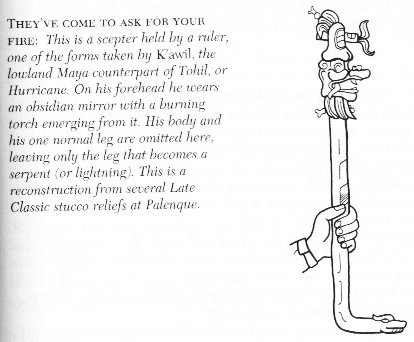 |
|
... According to
Gylfaginning, following the
murder of Baldr by Loki, the other
gods brought his body down to the
sea and laid him to rest on the
ship. They would have launched it
out into the water and kindled a
funeral pyre for Baldr but were
unable to move the great vessel
without the help of the giantess
Hyrrokkin, who was sent for out of
Jötunheim. She then flung the ship
so violently down the rollers at the
first push that flames appeared and
the earth trembled, much to the
annoyance of Thor. Along with Baldr,
his wife Nanna was also borne to the
funeral pyre after she had died of
grief. As Thor was consecrating the
fire with his hammer Mjolnir, a
dwarf named Litr began cavorting at
his feet. Thor then kicked him into
the flames and the dwarf was burned
up as well ...
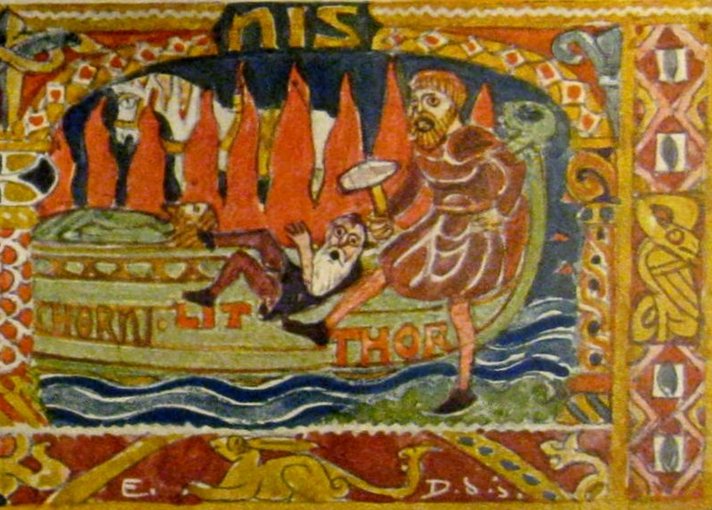 |
|
te ahi ki puhu ki
tunu te ika.he ui ka kore
he a(-) |
'Make a
fire and prepare the fish!' When
he saw that there was no fire [he
ui ka kore he ahi], Ira said,
'One of you go and bring the fire
from Hanga Te Pau'.
One of the young men went to the
fire, took the fire and provisions
(from the boat), turned around, and
went back to Hanga Hoonu. When he
arrived there [he tuu], he
sat down [he noho].
They prepared [he tunu]
the fish in the fire on the flat
rocks, cooked them, and ate until
they were completely satisfied.
Then they gave the name. 'The
rock, where (the fish) were prepared
in the fire with makoi (fruit
of Thespesia populnea?)
belongs to Ira'. |
|
hi he ki a
(i)ra.ka oho etahi ki
te ahi ka
too |
| mai.mai hanga te
pau.he oho mai etahi kope |
| ki
te ahi he
too atu
koia ko kai he hoki he oho |
| he tuu ki hanga
hoonu he tuu he noho he tunu i te |
| ika.i runga i te
papa he ootu he kakai ka ma(-) |
| konakona ro.he
nape i te ingoa.ko te papa tu(-) |
|
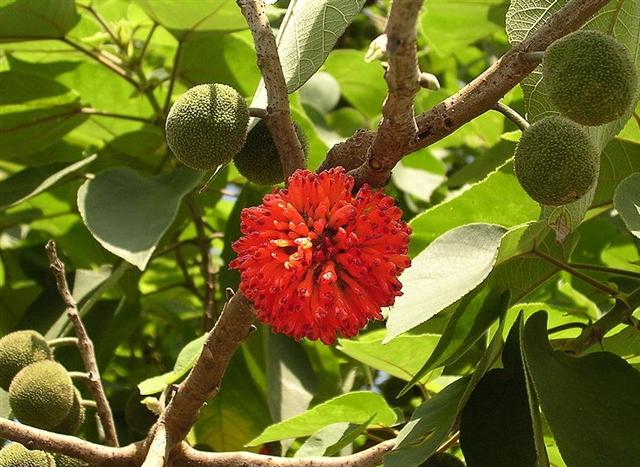
Makoi. The
tree which on T. was called miro,
Thespesia populnea. Van
Tilburg. Makoikoi, kidney T.
Churchill.
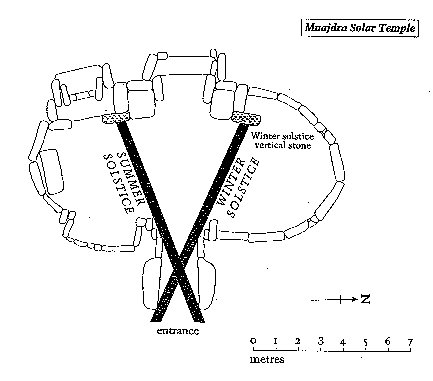
... The Mnajdra Temple is located on
Malta and very ancient, dating to
the time before the pyramids. Marija
Gimbutas: 'To sleep within the
Goddess's womb was to die and to
come to life anew'. In a system of
reincarnation the old one must die
in order to be reborn, of course. At
midsummer Sun comes to a standstill,
and this must therefore be an
occasion when the 'flame of life'
had to be transported into a new
body ... |
|
nu makoi a
Ira.he
noho erima raa i hanga ho(-) |
They remained in Hanga Hoonu for
five days. |
|
onu. |
|
... needfire ceremonies
usually take place near the summer solstice (the
Feast of St. John) ... but they occur in several
other seasons as well. The summer date of the
rite and its accompanying festival have to do,
among other things, with fertility, as can can
clearly be seen in a variant from the valley of
the Moselle preserved for us by Jakob Grimm.
Each household in the village was constrained to
contribute a shock of straw to the nearby high
place, Stromberg, where the males went at
evening while the females went to a spring lower
down on the slope. A huge wheel was wrapped with
this straw. An axle run through the wheel served
as the handles for those who were to guide it on
its downward plunge. The mayor of a nearby town
kindled the straw, for which office he was
rewarded with a basketful of cherries. All the
men kindled torches and some followed the
burning orb as it was released downhill to
shouts of joy. The women at the spring echoed
these shouts as the
wheel rushed by them. Often the fire went out of
its own accord before it reached the river, but
should the waters of the river extinguish it, an
abundant vintage was forecast for that year ... |
|
E:26 |
|
... In the beginning were Rangi
and Papa, Sky and Earth.
Darkness existed. Rangi
adhered over Papa his wife.
Man was not. A person arose, a
spirit who had no origin; his name
was Rangitokona, the
Heaven-propper. He went to Rangi
and Papa, bid them go apart,
but they would not.
Therefore
Rangitokona separated Rangi
and Papa, he thrust the sky
above. He thrust him with his
pillars ten in number end to end;
they reached up to the
Fixed-place-of-the-Heavens. After
this separation Rangi
lamented for his wife: and his tears
are the dew and the rain which ever
fall on her. This was the chant that
did the work:
Rangitokona,
prop up the heaven! //
Rangitokona, prop up the
morning! // The pillar stands in the
empty space. The thought [memea]
stands in the earth-world - //
Thought stands also in the sky. The
kahi stands in the
earth-world - // Kahi stands
also in the sky. The pillar stands,
the pillar - // It ever stands, the
pillar of the sky. Then for the
first time was there light between
the Sky and the Earth; the world
existed ...
|
 |
 |
|
kahi |
tapa mea |
|
|
i te rua te
kauatu matoru raa o te ana(-) |
On the
twenty-third day of the month of
July ('Anakena', they reached Rangi
Meamea. When they arrived there,
they looked around and gave the name
'Rangi Meamea A Hau Maka'. They
also named the mountain 'Peke Tau O
Hiti [A] Hau Maka'. |
|
kena i
oho mai ai ki rangi meamea.he |
| tuu he ui he
tikea he nape
i te ingoa.ko ra(-) |
|
ngi meamea.a
hau maka.he nape tokoa |
|
i te ingoa o
te maunga ko peke tau o hiti |
|
Peke.
1. To bite (of fish or
lobster pecking at fishhook). 2. To
repeat an action: he-peke te rua;
ina ekó peke-hakaou te rua don't
you do it a second time; ina ekó
peke hakaou-mai te rua ara,
don't come back here again. Vanaga.
To succeed, to follow. Pau.: peke,
to follow, to accompany. Ta.: pee,
to follow. Churchill. Mgv.:
Pekepeke. 1. The tentacles of
the octopus retracted. Mq.: peke,
to tuck up the clothes. Ma.:
pepeke, to draw up the legs and
arms. 2. A crab. Ha.: pee-one,
a crab that burrows in the sand.
Churchill. Hiti. 1. To show
itself again, to reappear (of the
new moon, of a constellation -
meaning uncertain). 2. Said of thin,
tough-fleshed fish of indifferent
taste: ika hiti. 3. Said of
fish when they come to the stones of
the shore for insects among the
seaweed: he hiti te ika. 4.
To reproach someone for his
ingratitude. Vanaga. 1. To rise, to
appear, to dawn; hitihaga,
rising; hitihaga roa,
sunrise; hitihiti, to dawn;
horau hitihiti, break of day;
hakahiti ki te eeve, to show
the buttocks. 2. Puffed; gutu
hiti, thick lips. Churchill. |
|
a hau maka.he
vari mai ki te
rua painga |
They
went around [he vari] to the
other side of the mountain Hau Epa,
looked around, and gave the name
'Hau Epa A Hau Maka'. |
| o maunga hau
epa.he tikea.he
nape i te |
|
ingoa ko
maunga hau epa. a Hau maka. |
|
Mauga. 1. Last; aga maúga o
te Ariki o Hotu Matu'a, King
Hotu Matua's last work. 2. Hill,
mountain. Mouga, moúga. Last;
vânaga moúga o te Ariki O Hotu
Matu'a, the last words of King
Hotu Matu'a. Vanaga. Mauga kore,
impalpable. Mouga. 1. Enough,
that's all, at last. 2. Mountain,
ridge of hills; mouga iti,
hillock; tua mouga, mountain
top; hiriga mouga; hillside,
declivity, slope. P Pau.: mahuga,
mountain. Mgv.: mou, maga,
mountain. Mq.: mouna,
mouka, peak or crest of a
mountain. Ta.: maua, moua,
mountain. 3. Extinction, end,
interruption, solution; te mouga
o te hiriga, end of a voyage;
pagaha mouga kore, without
consolation. 4. To get. Churchill.
Epa. To extend horizontally,
to jut out. Vanaga. |
| he vari hokoou
mai ki te rua
painga o |
Not translated by
Barthel. |
|
maunga hau epa. |
|
Vari. 1. Menstruation,
period (also: tiko). 2. To
tack, to veer (nautical);
ku-vari-mai-á te miro, the boat
arrives, have veered [around Rano
Kau]. Vanaga. About,
circumference, to turn in a circle;
hakavari, pliant, to bend,
square; varivari, about, to
go around; vavari, a garland;
varikapau, circumference, to
surround, a compass, to admire;
hiriga varikapau, to go in a
ring; pa varikapau, to close
in; varitakataka (vari-taka
3) to surround. Churchill. Pau.:
Vari, marsh, mire, dirt. Ta.:
vari, dirt, mud. Rar.: vari,
mud. Churchill. Mgv.: Vari,
paste well diluted. Mq.: vaivai,
to dilute, to thin. Ha.: waliwali,
soft, pasty. Churchill. |
|
... Ebony label
EA 32650 from Den's tomb. The
upper right register depicts king
Den twice: at the left he is sitting
in his Hebsed pavilion, at the right
he is running a symbolic race around
D-shaped markings. This ceremony is
connected to the so-called 'race of
the Apis bull'. The middle right
section reports about the raid of
the city 'beautiful door' and about
a daughter of Den suffering from an
unknown disease. The lower right
section reports about the visitation
of the 'souls of Peh' at the royal
domain 'Wenet'. The left part of the
label describes the content of the
vessel that once belonged to the
label and mentions the high official
Hemaka, who was obviously
responsible for the delivery of the
labeled jar ...
.jpg) |
Barthel has chosen to translate ki te
rua painga with 'to the other side'
and then disregarded the 2nd 'daughter
of Den'.
... There was no water in the
village. The lakes and rivers were dry. Raven
and Crow, two young girls who were having their
first menstrual courses, were told to go and
draw water from the ocean. Finding the journey
too long, Raven decided just to urinate into her
basket-bucket. She decieved no one and was
severly scolded. Crow returned much later but
with drinking water. As a punishment, Raven was
condemned never to find water in the summer;
only in winter would she find something to
drink. For that reason the Raven never drinks
during the hot months; she speaks with a raucous
voice because of her dry throat ...
Another interpretation could be the 2nd
(summer time) 'interrex':
|
Paina. Human likeness, large doll
(made in ancient times). Vanaga. T. To
make a noise. H. To sound, as in
breaking or tearing anything. Churchill.
Although the Easter Islanders still
cautiously kept all their small stone
and wood carvings in hiding, they did
reveal their own artistic talent and
activity by carrying forth colossal
paina figures in the presence of the
Spaniards [1770]. These were skilfully
made light-weight dolls of superhuman
size, fashioned from painted bark-cloth
stuffed with branches, grass, and reeds.
They were carried in processions and
erected at the side of old image
platforms, as if they represented some
substitute for the giant stone men of
the Middle Period that this historic or
Late Period population was unable to
carve or erect. Agüera (Ibid., p.
95) gave the following account of the
paina figures, after a description
of the ancient stone statues of which an
unspecified number were still standing
on ahu: 'They have another effigy
or idol clothed and portable which is
about four yards in length: it is
properly speaking the figure of a Judas,
stuffed with straw or dried grass. It
has arms and legs, and the head has
coarsely figured eyes, nostrils, and
mouth: it is adorned with a black fringe
of hair made of rushes, which hangs
half-way down the back. On certain days
they carry this idol to the place where
they gather together, and judging by the
demonstrations some of them made, we
understood it to be the one dedicated to
enjoyment... (Heyerdahl 3)
Der Cultus bestand in Anrufung der
Götter, deren Willen der Priester
erklärte, in Opfern an Lebensmitteln,
auch an Menschen, und in der Feier
gewisser, zu bestimmten Zeiten
wiederkehrender Feste (rakauti),
von denen das erste im Früjahr 2 Monate
dauerte, das zweite im Sommer mit der
Errichtung einer Pyramide aus Zweigen (paina)
endete, das dritte in den Winter fiel;
bei allen fanden Tänze, Gesänge, Spiele
aller Art statt. (Churchill: From Die
Inseln des stillen Oceans by Carl E.
Meinicke; zweiter Theil, 1876, p. 228.) |
... 'In Upper Egypt', wrote
Sir James G. Frazer in The Golden Bough,
citing the observations of a German
nineteenth-century voyager, 'on the first day of
the solar year by Coptic reckoning, that is, on
the tenth of September, when the Nile has
generally reached its highest point, the regular
government is suspended for three days and every
town chooses its own ruler. This temporary lord
wears a sort of tall fool's cap and a long
flaxen beard, and is enveloped in a strange
mantle. With a wand of office in his hand and
attended by men disguised as scribes,
executioners, and so forth, he proceeds to the
Governor's house. The latter allows himself to
be deposed; and the mock king, mounting the
throne, holds a tribunal, to the decisions of
which even the governor and his officials must
bow. After three days the mock king is committed
to the flames, and from its ashes the Fellah
creeps forth ...
Probably the idea of a zodiac came
from Upper Egypt at the bend of the Nile, for
recently they have (at The Red Mound) discovered the remnants of a very old zoo - a
circular royal compound with various animals
which later became well known in the
Egyptian pantheon.
"Nekhen ... or Hierakonpolis
... Ancient Greek: Hierakōn
polis 'Hawk City', Egyptian Arabic:
el-Kōm el-Ahmar,
lit. 'The Red Mound', was the religious and
political capital of Upper Egypt at the end of
prehistoric Egypt (c. 3200-3100 BC) and probably
also during the Early Dynastic Period (c.
3100-2686 BC)." (Wikipedia)
... The sacred king pretended
to die at sunset; the boy interrex was at
once invested with his titles, dignities, and
sacred implements, married to the queen, and
killed twenty-four hours later ...
... Robur Carolinum,
Charles' Oak, the Quercia of Italy
and the Karlseiche of Germany, was
formally published by Halley in 1679 in
commemoration of the Royal Oak of his patron,
Charles II, in which the king had lain hidden
for twenty-four hours after his defeat by
Cromwell in the battle of Worcester, on the 3rd
of September 165 ...
.jpg)
|
kua tupu te mea ke |
kotîa
hia |
te kava tu |
|
Tia.
(Tiha G) .To sew. T Mgv.:
tia, to prick, to pierce,
to stick in. Churchill. Ta.:
tia, the lower belly. Mq.:
tia-kopu, pubes. Ma.:
tia, the lower abdomen.
Tiahonu, to piece together.
Mq.: tuhonu, to mend, to
patch. Ma.: tuhonu, to
join. Churchill. Mq.: tiaha,
drinking cup. Ha.: kiaha,
a cup, a mug. Tikao, to
dig out, to disembowel. Ma.:
tikaro, to dig out of a
hole. Churchill. KIA.
s. Haw., pillar or inner
post of a house supporting the
roof, any kind of pillar or
post, a mast of a vessel;
kia-aina, a supporter of the
land, a governor of a province.
Marqu., tia, id. Sam.,
ti'a, the stick used in
tanga-tia, a man's head
(abusively); tia-pula,
taro-tops cut off for planting.
Sunda, tihang. Mal.,
tiang, a pillar. Greek,
κιων,
a pillar, support of the roof,
the identical sense of the
Polynesian usage of the word.
Liddell and Scott give no
etymology or connections of
κιων.
(Fornander)
Koti.
Kotikoti. To cut with
scissors (since this is an old
word and scissors do not seem to
have existed, it must mean
something of the kind). Vanaga.
Kotikoti. To tear;
kokoti, to cut, to chop, to
hew, to cleave, to assassinate,
to amputate, to scar, to notch,
to carve, to use a knife, to cut
off, to lop, to gash, to mow, to
saw; kokotiga kore,
indivisible; kokotihaga,
cutting, gash furrow. P Pau.:
koti, to chop. Mgv.:
kotikoti, to cut, to cut
into bands or slices; kokoti,
to cut, to saw; akakotikoti,
a ray, a streak, a stripe, to
make bars. Mq.: koti,
oti, to cut, to divide. Ta.:
oóti, to cut, to carve;
otióti, to cut fine.
Churchill. Pau.: Koti, to
gush, to spout. Ta.: oti,
to rebound, to fall back.
Kotika, cape, headland. Ta.:
otiá, boundary, limit.
Churchill. |
 |
 |
 |
 |
 |
|
Cb6-19 |
Cb6-20 |
Cb6-21 (136) |
Cb6-22 |
Cb6-23 → 6 * 23 = 186 |
|
CLOSE TO THE FULL MOON: |
|
"July 18 |
19 (200) |
20 |
21 |
22 / 7 → π |
|
φ Hydrae
(160.3) |
no star listed (161) |
VATHORZ POSTERIOR = θ Carinae
(162.1),
PEREGRINI = μ Velorum,
η Carinae
(162.6) |
ν Hydrae (163.1) |
no star listed (164)
ALTAIR (α Aquilae)
|
|
... This [η
Carinae] is one of the most
noted objects in the heavens,
perhaps even so in almost
prehistoric times, for
Babylonian inscriptions seem to
refer to a star noticeable from
occasional faintness in its
light, that Jensen thinks was
η. And
he claims it as one of the
temple stars associated with Ea,
or Ia, of Eridhu¹, the Lord of
Waters, otherwise known as
Oannes², the mysterious human
fish and greatest god of the
kingdom.
¹ Eridhu, or
Eri-duga, the Holy City, Nunki,
or Nunpe, one of the oldest
cities in the world, even in
ancient Babylonia, was that
kingdom's flourishing port on
the Persian Gulf, but, by the
encroachment of the delta, its
site is now one hundred miles
inland. In its vicinity the
Babylonians located their sacred
Tree of Life.
² Berōssōs
described Oannes as the teacher
of early man in all knowledge;
and in mythology he was even the
creator of man and the father of
Tammuz and Ishtar, themselves
associated with other stars and
sky figures. Jensen thinks
Oannes connected with the stars
of Capricorn; Lockyer finds his
counterpart in the god Chnemu of
Southern Egypt; and some have
regarded him as the prototype of
Noah ...
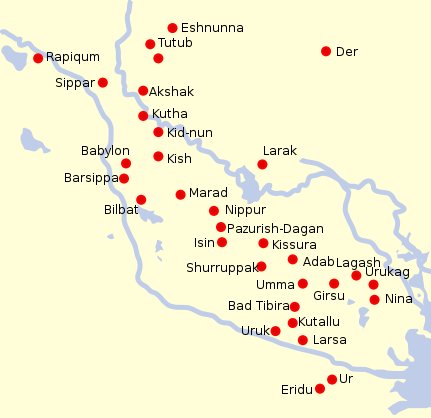 |
|
HANGA HOONU |
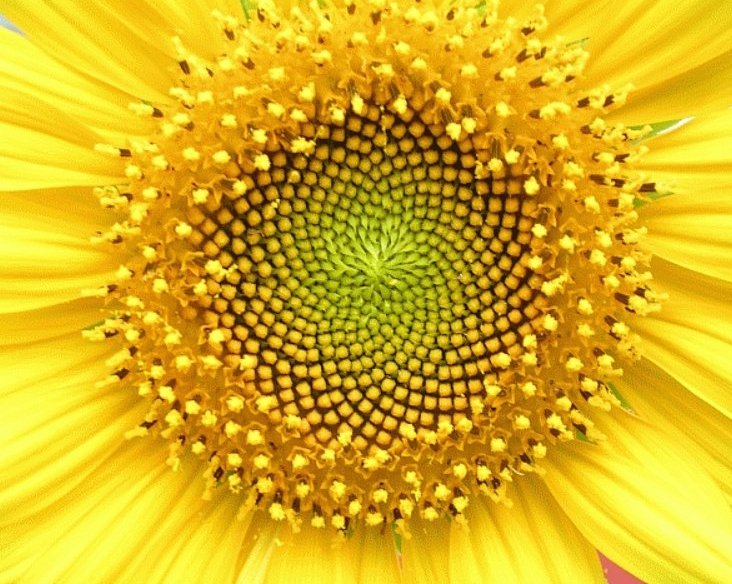
| kiore |
 |
|
Cb6-24 (392 + 139 = 531 = 18 * 29½)
|
|
TE ANAKENA 23 (166 + 38) |
|
RANGI MEAMEA |
Day 531, we should remember, was connected
with Pu Mahore:
|
tagata mau matagi |
ihe toga maa |
ura hia |
tagata maú kihikihi erua |
|
Ura.
Ura, lobster. Ûra,
flame, blaze (ûra ahi), to
become furious (with manava
as subject: ku-ûra-á te manava).
Úraúra, bright red. Vanaga.
1. Crayfish, lobster, prawn. P Mgv.:
ura, crayfish. Mq.: uá,
lobster. Ta.: oura, crayfish,
lobster. 2. Fire, burning, to be in
flames; uraga, combustion,
flame, torch; hakaura, to
cause to glow, to kindle, to light.
P Mgv., Ta.: ura, a flame, to
burn. Mq: uá, id. Uraga,
burden, load, weight. Uraura,
vermilion, scarlet. P Pau.:
kurakura, red. Mgv.: uraura,
an inflamed countenance. Mq.:
uáuá, red, ruddy. Ta.: uraura,
red. Churchill.

Koura. 1.
Fry, spawn, roe. 2. Flea. P Mgv.:
ura, crayfish, lobster. Mq.:
koua, ua, id. Ta.:
oura, id. The preface ko
to the stem ula distinguishes
the Tongafiti. We therefore assign
the word in Rapanui and Tahiti to a
Tongafiti source, in Mangareva to a
Proto-Samoan source, and Marquesas
shows both ... Rapanui is the only
language which defines the flea
otherwise than in terms of the
louse, commonly kutufiti the
jumping louse. Pediculus is
ancestral in the South Sea, the flea
seams to have been contributed by
the first of the explorers.
Churchill. |
 |
 |
 |
 |
|
Cb5-4 |
Cb5-5 |
Cb5-6 |
Cb5-7 (101 → Sirius) |
|
CLOSE TO THE FULL MOON: |
|
AL TARF (The End) = β Cancri
(124.3)
RAS
ALGETHI (α Herculis)
|
χ Cancri (125.2),
BRIGHT FIRE
= λ Cancri
(125.4)
*84.0 = *125.4 - *41.4 |
AVIOR = ε Carinae
(126.4), φ Cancri (126.8)
*85.0 = *126.4 - *41.4 |
ο Ursa Majoris (127.4)
*86.0 = *127.4 - *41.4 |
|
July 23 (204) |
24 |
25 (193
+ 13 = 175 + 31) |
26 |
|
"June
12 |
13 (164) |
14 |
TE MARO 15 (531) |
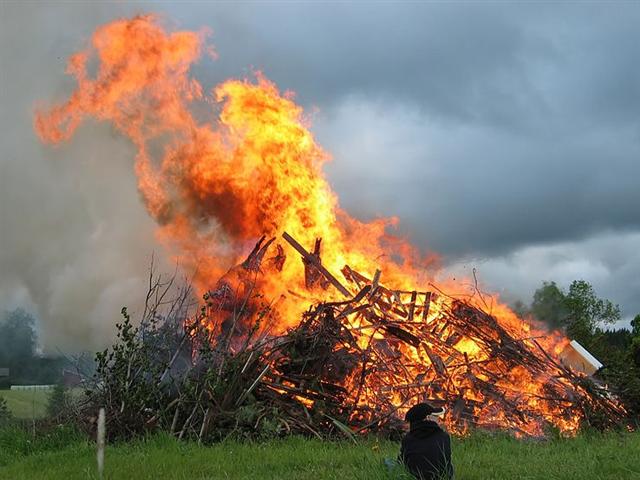 |
 |
 |
 |
 |
|
Ga3-1 (60) |
Ga3-2 (61) |
Ga3-3 |
Ga3-4 |
|
CLOSE TO THE SUN: |
|
July 23 (204) |
24 |
25 (193
+ 13 = 175 + 31) |
26 |
|
Counting from the preceding "January
1 this was day 531 (= 365 + 166). In
other words Pu Mahore A Hau Maka
O Hiva was at the position of 18
lunar synodic months. Here was 18 *
29½ = 531. Here
was 'the fish Mahore, who was in a
(water) hole to spawn'.
...
he oho mai te kuhane o hau maka.he
tomo ki uta ki te kainga.he ui te
kuhane ko te mahore
ka noho i roto i te pu
...
... P Pau.: kake, to
climb, to ascend. Mgv.: kake,
the
arrival of shoals of spawning
fish. Mq.: kake,
to climb up a valley ...
 |
 |
|
manu kake |
Ga3-1 (60) |
|
|






.jpg)
.jpg)










